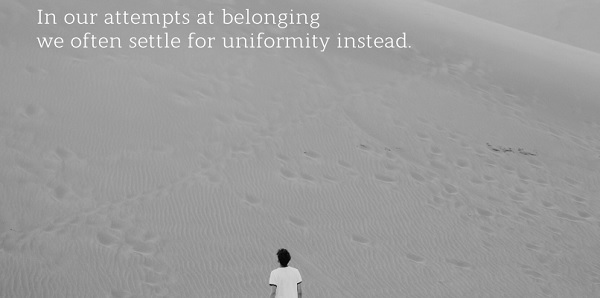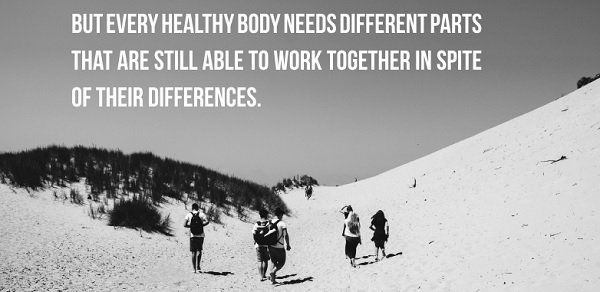Beautifully Different Together
By Matt Reffie

As a young man reading through the New Testament on his own, I envisioned Christian Community to be something like a post-apocalyptic enclave, gathering together in the shadows as the world whirled around them. Huddling together to care for and encourage one another was necessary for survival, but so was venturing out to support and connect with others. The standard cares of the world were tossed aside; familial connections, personal property, and career ambitions were all now secondary concerns. When they gathered together, there was an urgency and seriousness about their meeting; it was vital.
I have been fortunate to experience hints of this two-thousand-year-old vision in my Christian walk. For instance, my campus minister in college spent his days on campus making himself available to any student who might need some help getting through the day or week, with only the smallest of paychecks to live on for it. When most guys his age were busy establishing careers, marriages, and families, he put his entire future on hold to fill the spiritual needs of our campus. Growing up, it was my mother who showed me what it was like to have vibrant church community. Going to church each Sunday, it was evident to me, even as a child, that we didn’t go just for the sake of going. It was vital to her, vital enough to wrangle my brother and me out of bed and drive forty-five minutes through winding country roads to get there. The community she had there was real, something more than just the enjoyment of casual friends. It was a level of support and understanding that she couldn’t readily get anywhere else. Through my mom’s example, I knew what they were saying in Sunday school and during the Sunday service was important, so I listened. More often than not, what I heard was God himself. When the teacher shared a lesson with us, it was God in my ear confirming it for me or further explaining it to me.

In this way, I have always had a bit of a strange relationship with Church communities. My connection with God came relatively easily, but figuring out where everyone else fit into my faith has been a lifelong challenge. There have been times when I’ve felt God telling me something different from what the pastor or Sunday school teacher was saying. This shouldn’t seem unusual, as even the Early Church communities had plenty of disagreements. However, it has been my experience to more often see differences dissolved rather than resolved. “Who God is” and “what Christ-followers look like” are reduced to simple, closed answers rather than vibrant “iron sharpening iron” discussion. Engaging differences of opinion has always been a part of the “two-thousand-year-old vision” of Christian community, but in our attempts at belonging we often settle for uniformity instead. I have found I desire to belong to communities that can both challenge my thinking and be open to having their own thinking challenged as well.
I have found I also need a church community that shares a sense of necessary connection with God in their lives. It seems as though God is often merely a helpful add-on for tackling life’s challenges and ambitions. The same urgency for connection with God which I saw in my mother’s walk and in the lives of several others in and around the churches I have attended wasn’t always reflected in the churches as a whole. Furthermore, there was a distinct difference in the faith I found in a relationship with a living, breathing, speaking God and the god of “dos and don’ts” that seemed to be the main focus for so much of the church’s time together. For much of my youth I lacked any substantial Christian fellowship outside of my relationship with my mother and my pastor, both of whom I couldn’t readily connect with as peers due to age differences. It wasn’t until college that I met my campus minister and a few other Christians with whom I could more readily relate to and enjoy a deeper level of fellowship.

One small moment of belonging that has stuck with me happened in the first few weeks of attending a new church with the Christian friends I had found at college. It was a small church that met in a school gymnasium, and after one service many of the regular members were busy putting away folding chairs and cleaning up after Sunday school activities. While I was standing around chatting, one of the deacons came up and asked if I would help him count the offering. Setting aside the fact that I am horrible with numbers, the invitation struck me, because I had assumed the church wouldn’t want someone they didn’t know very well counting their money! It was a small, yet impactful invitation to be a part of what they were doing. Instead of asking me if I was good with numbers, if I planned on officially joining the church, or worrying about my trustworthiness, they chose to invite me in without preconditions. It was the first small step in what would become my five years of serving in that church as a minister, mentor, and deacon.
While I deeply enjoyed my time with that community, I eventually felt called into something of a wilderness period, when I grew in my relationship with God in relative isolation from any community of believers. I would visit and interact with different faith communities along the way, but didn’t feel as though God was moving me in the same direction that they were pursuing in their ministries. One example of this incongruence was a small group ministry I attended locally for about a year. The focus was on discussing materials that interacted with the sermon from the past Sunday. While I enjoyed the friends I made there, it was frustrating to have to interact through the structure of sermon follow-up questions each week, rather than simply engage in each other’s daily lives. The programming, well intended as it was, became a barrier to the kind of community I felt called to.

Along the way, I’ve ended up finding others like me who have found themselves without a regular faith community. For a time, a group of us wanderers got into the habit of meeting for breakfast on Sunday mornings just to talk faith and life. While we did not “share everything together” like the early Church, we did share a meal and try to encourage each other in pursuing whatever we felt called to be doing. It was what I needed at the time, far more than I needed an inspiring sermon or a Bible study on the Book of Acts. More and more I find that I need community that is living the messy life of faith found in Acts, so I make a habit of getting together with people in ways similar to our Sunday breakfasts. One of the hallmarks of these gatherings seems to be “listening.” One of the small Wednesday night groups I currently attend focuses on “empathetic listening,” where we hold off on jumping into fixing each other or responding with a Bible verse too quickly. Instead, we listen and ask probing questions until we’re able to understand where someone is coming from and how best to continually encourage them in their walk. Each of our lives is complex, so we’re careful not to leave each other with simple answers.
Too often I feel like our church communities come packaged with a lot of behavior and performance expectations. Belonging means conforming to the looks, language, and values of the rest of the body. But every healthy body needs different parts that are still able to work together in spite of their differences. I long to belong to communities where correction and rebuke come in the form of sympathetic questions and lots of listening. Where the young woman in Christ is able to be heard just as well as the charismatic pastor or long-serving elder. And where the church’s programming is characterized by the messy business of being beautifully different together in Christ.


 Matt Reffie studies Church History and sells antique documents and ephemera for a living. He grew up in rural Pennsylvania and has worked with Lutheran, Baptist, Presbyterian, and Mennonite congregations as an associate pastor, deacon, and campus minister over the years. He currently lives in Somerville, MA with his wife, Audrey, and thoroughly enjoys being 'tickle monster' to their ten nieces and nephews.
Matt Reffie studies Church History and sells antique documents and ephemera for a living. He grew up in rural Pennsylvania and has worked with Lutheran, Baptist, Presbyterian, and Mennonite congregations as an associate pastor, deacon, and campus minister over the years. He currently lives in Somerville, MA with his wife, Audrey, and thoroughly enjoys being 'tickle monster' to their ten nieces and nephews.